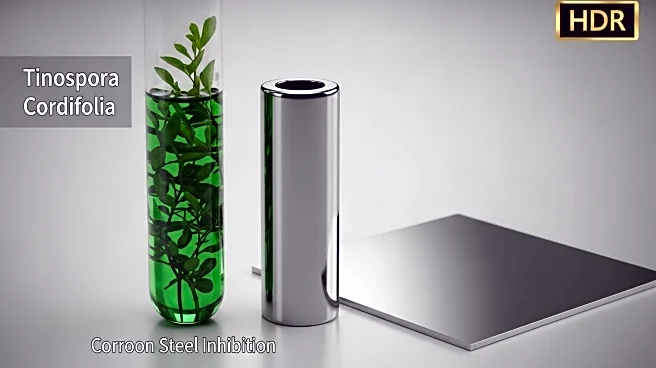What's Happening?
Research has explored the use of Tinospora cordifolia fractions as a novel corrosion inhibitor for carbon steel in seawater environments. The study employed various analytical techniques, including UV-Vis, FT-IR, HR-MS, and NMR, to identify the bioactive compounds responsible for corrosion inhibition. The results indicated that compounds such as phenols, flavonoids, and esters in the extract form a protective layer on the steel surface, reducing its interaction with corrosive media. Electrochemical studies demonstrated the effectiveness of the extract in stabilizing open circuit potential and reducing corrosion current density, highlighting its potential as a green corrosion inhibitor.
Why It's Important?
Corrosion of carbon steel in seawater environments is a significant issue, affecting various industries and infrastructure. The use of natural plant extracts as corrosion inhibitors offers a sustainable and environmentally friendly alternative to synthetic inhibitors, which may be toxic. The study's findings suggest that Tinospora cordifolia extracts could enhance the corrosion resistance of steel structures, potentially reducing maintenance costs and extending their lifespan. The research also highlights the importance of exploring natural compounds for industrial applications, contributing to the development of green technologies.
What's Next?
Further research is needed to evaluate the long-term stability and effectiveness of Tinospora cordifolia extracts in real-world applications. The study suggests optimizing the extraction method to maximize the concentration of active compounds and standardizing the formulation for large-scale use. Future studies should also explore the potential of these extracts in other corrosive environments and investigate their compatibility with existing coatings and treatments.
Beyond the Headlines
The study emphasizes the potential for natural plant extracts to provide sustainable solutions in industrial applications. The use of Tinospora cordifolia as a corrosion inhibitor highlights the broader implications of green chemistry in reducing environmental impact and promoting sustainability. The research also points to the need for interdisciplinary approaches, combining chemistry, materials science, and engineering to develop innovative solutions for corrosion management.









